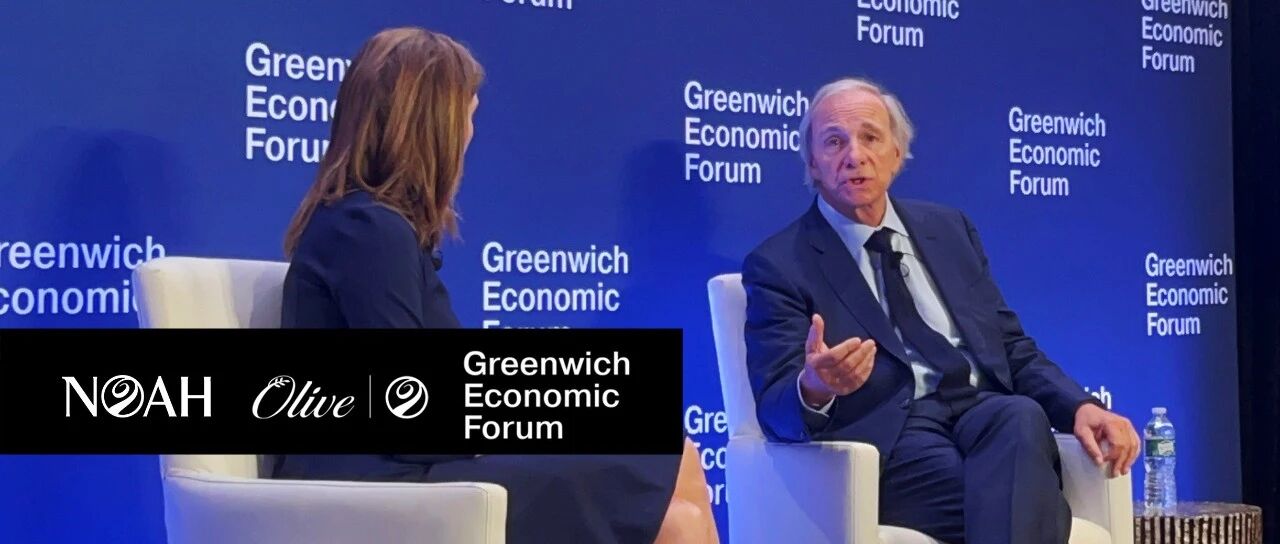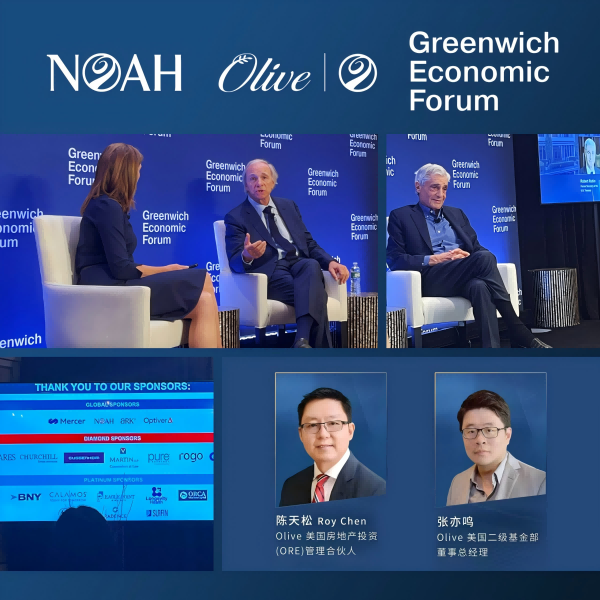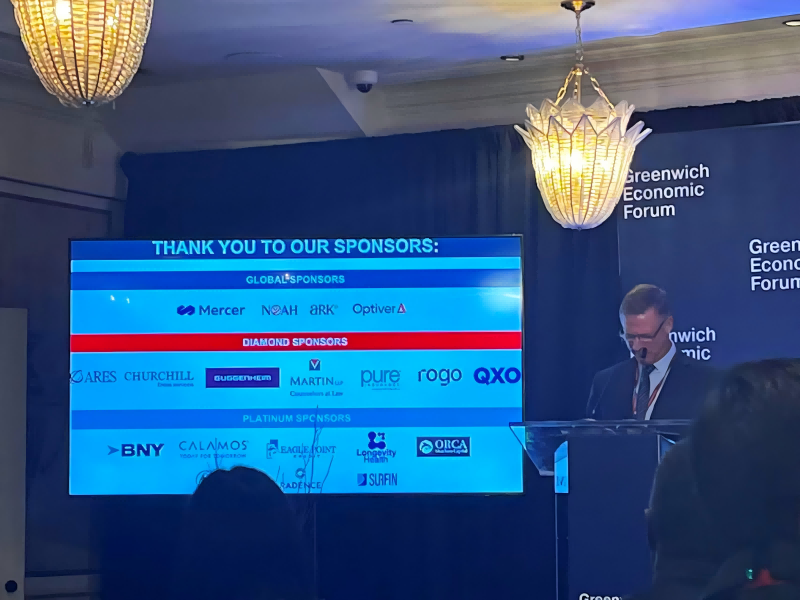

Roy Chen: Managing Partner at Olive Real Estate (ORE)
Yiming Zhang: Managing Director of Olive Global Public Markets (US)
Recently, key executives from Olive Asset Management ("Noah Olive") and their clients returned to the Greenwich Economic Forum (GEF). There, they joined Bridgewater Associates founder Ray Dalio, The Black Swan and Antifragile author Nassim Nicholas Taleb, former US Treasury Secretary Robert E. Rubin, and over 400 top global fund managers, macro-scholars, policymakers, and thought leaders to discuss macro trends, capital flows, and the future of wealth.
Greenwich is not just a symbolic landmark for hedge funds. It is a sanctuary for shared wisdom, where Noah ARK can consistently reconnect with global Chinese families and respected intellectual peers. Having partnered with GEF for eight years, Noah appeared this time as a Global Partner, standing with Chinese wealth managers on the world's most prominent financial stage.
At this summit, distinguished Noah clients not only had the chance to explore investment strategies and philosophies of masters like Dalio, Rubin, and Taleb, but also gleaned insights into global wealth allocation from engaging roundtable discussions on topics such as infrastructure, real assets, and digital asset strategies. These discussions were further enriched by the Noah Olive US team's "on-the-ground insights," which provided practical references and inspiration for their global asset allocation decisions.
Leader Allocations: Gold, Private Equity, AI...
(4)_2cee8694f4da4a1a8e2b0c17bc16512b.jpg)
Ray Dalio shared the five key forces affecting the global economic landscape: the wealth gap, geopolitical cycles, natural disasters, technological advancement, and capital imbalances. He emphasized the safe-haven value of gold, believing it to be a "hard asset" against currency devaluation and that it should comprise about 15% of an investment portfolio.
Dalio compared the current economic environment to the early 1970s, when high US inflation, massive government spending, and a heavy debt burden shook confidence in paper assets and fiat currency. Gold, he noted, plays a unique hedging role during times of currency devaluation and geopolitical uncertainty. "Gold is the only asset you can hold yourself that doesn't depend on someone else to make good on it." Historically, when currencies weaken, gold and stock markets often hit new highs. Furthermore, Dalio stated that the technological revolution, especially AI, could profoundly change the global economic and social landscape. Governments need to provide direction for technological development.
(6)_f50365cba97246edb8e0e2d083ee5240.jpg)
Robert E. Rubin reminded attendees that the Federal Reserve must be highly vigilant against inflation risks. Looking back at the 1970s, once inflation triggers a "self-fulfilling expectation effect," people begin to expect continued inflation and thus raise prices and wages in advance, making it much harder to suppress. He also pointed out that the impact of AI will exceed that of globalization and trade, requiring society to build stronger response mechanisms. Currently, his investment strategy is focused on US private equity, and he holds cash to hedge against systemic risks.
When discussing tariffs and trade, Rubin further noted that tariffs are essentially a "regressive tax." They not only drive up production costs and weaken corporate competitiveness, but their contribution to fiscal revenue is also very limited — about US$200 billion annually, far from enough to cover the massive fiscal deficit. More importantly, long-term high-tariff policies will drag down economic growth and could reignite inflation expectations. Rubin emphasized that free trade remains a vital cornerstone for maintaining America's long-term competitive advantage.
(5)_107b01e3f7724df0a49c616163148b63.jpg)
In his session, Taleb emphasized that the current global landscape is in a state of high volatility and uncertainty. Only by building an "antifragile" system can one become stronger amidst shocks. He pointed out that truly resilient societies and institutions do not rely on avoiding risk, but rather on absorbing volatility and evolving from it to gain lasting competitiveness. Amid today's geopolitical uncertainty, gold is being redefined as a "store-of-value currency" — no longer just a commodity, but a cross-cycle, cross-system anchor of value.
When discussing AI and risk management, Taleb noted that AI's impact is expanding from traditional low-skill jobs to high-skill professions, including doctors and other specialists. He stressed that in an era of uncertainty, investors and institutions must establish tail-risk hedging mechanisms to ensure survival in extreme scenarios.
Infrastructure and Digital Currencies: Entering a New Era of Investment

In the GEF roundtable on infrastructure and real assets, panelists agreed that global infrastructure investment is entering a transformative new cycle. This shift is driven by four key areas: AI-powered energy systems, digital infrastructure, the green transition, and supply chain reshoring—with credit and flexible capital serving as critical enablers. Over the next decade, the infrastructure sector's most compelling investment opportunities will emerge from the convergence of energy transition and digital economy development, positioning these areas as major growth engines for capital markets.
Meanwhile, the digital asset strategies roundtable pointed out that digital currencies are gradually evolving into a "gold-like" global asset, with a wave of institutionalization and new investment tools reshaping the market structure. As the regulatory environment continues to improve, capital inflows into the digital asset market will also become increasingly predictable, offering investors new paths for hedging and appreciation.
Noah has always resonated with the world's most cutting-edge thinkers, providing global Chinese high-net-worth families with time-tested strategic asset allocation advice. This year, the eight major trends in the NOAH Holdings | ARK Wealth H1 2025 CIO Report were fully validated by the market, providing a foundation for the second half of the year. The newly released NOAH Holdings | ARK Wealth H2 2025 CIO Report then pointed out that we are entering a new capital era dominated by "technology-driven deflation." It continues the "structural asset allocation" framework, proposing ten core judgments and recommendations covering macro structure, key asset themes, and strategic execution.
Whether in AI, gold, private equity, hedge funds, infrastructure, or digital currencies, Noah's strategic asset allocation logic is deeply aligned with the forward-looking judgments of global thought leaders. The report further states that the development of AI is rewriting the rules of wealth. Gold remains a safe-haven anchor amid traditional market turmoil, while "base portfolio strategies" represented by infrastructure investment and REITs possess stable, cycle-resistant attributes. Furthermore, the convergence of AI advancement and the global energy transition have positioned digital and renewable energy infrastructure as critical long-term investment sectors, including data centers, wind, solar, and nuclear power facilities. Additionally, digital currencies are emerging as the "digital gold" of the tech-deflation era, with their built-in deflationary mechanisms serving as an effective hedge against inflation.
Noah Olive US "On-the-Ground Insights": US Real Estate, Hedge Funds

What about US real estate? Roy Chen, Managing Partner at Olive Real Estate (ORE), offered compelling insights into US commercial real estate (CRE) opportunities amid shifting interest rates. He pointed out that as the Federal Reserve enters a rate-cutting cycle, improving market liquidity and falling financing costs are moving CRE from a price adjustment phase to a valuation recovery period. With asset values rebounding and transaction volumes surging, now represents a critical "left-side" allocation opportunity for investors.
Roy Chen also cautioned that while the macro environment is easing, investing in real estate projects still requires a focus on operational risk. He stressed that truly high-quality real estate investment is not just about location and timing; it is about achieving a dynamic hedge across the "three curves" of cost, construction timelines, and leasing. By strategically managing contract terms and timing, investors can lock in opportunities with greater certainty.
Yiming Zhang, Managing Director of Olive Global Public Markets (US), believes hedge funds offer unique value. He noted that hedge funds differ significantly from traditional equity investments: overall, equity-related funds account for only about 30%–40%, with the majority having a low correlation to stocks. Even among equity-type funds, many employ market-neutral strategies.
What are the advantages of overseas hedge funds? Yiming Zhang believes their unique edge lies in strategic diversification and differentiation. Through hedge funds, investors can achieve fully hedged, short, or neutral positions, meaning there are opportunities to profit whether the stock market rises or falls. At the same time, hedge funds can invest in assets or volatility strategies uncorrelated with stock market trends, providing negative or non-correlated return streams to the portfolio and thus enhancing their overall robustness.
Noah is committed to translating cutting-edge macro analysis, innovative investment philosophies, and practical experience into actionable strategies for clients. This allows every client to gain an information advantage, seize investment opportunities, and achieve stable, long-term wealth growth and appreciation in a complex and ever-changing market.
At this year's GEF, Noah not only gave clients a front-row seat to the forward-looking insights of top global investors but also provided them with unique asset allocation references and practical opportunities. Looking ahead, we will continue to create opportunities for our clients to "walk with the wise," connect with smart investors, and ultimately make wealth smarter.










_182052358a184e65886175c58fdf921e.png)
_0f1cc69bebe24f1e9617200ffbfcb4b4.png)
